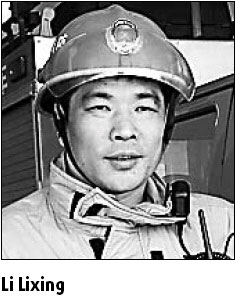| As a little boy, Li Lixing dreamed of one day being a hero. Instead he grew up to become the owner of a garment processing company.
However, rather than give up on his ambition, in 2003, Li set up a volunteer firefighting team within his own company. It now has 14 members and five vehicles.
And earlier this year, the 46-year-old entrepreneur's boyhood dream was finally realized when he was given the title of "Civilian Hero" by the Hangzhou city government.
"I do it out of my own interest, the satisfaction of saving another's life it has nothing to do with enhancing the reputation of my company," Li told China Daily during an interview at his factory.
He established the Jinlipu Garment Co 10 years ago.

Located in Puyang county, about 40 minutes' drive from downtown Hangzhou, the firm has 200 employees and processes clothes for export to South Korea.
Li has three other factories in Jiangxi Province, which have a combined annual turnover of 50 million yuan ($6.7 million).
The 14 firefighting volunteers are all members of his workforce, taken from the shop floor and management.
"We are on standby 24 hours a day, and can be ready to leave within two minutes of getting a call," Li, who is also the team's commander, said.
When accidents occur in the Puyang area, the team is invariably first on the scene, as the official fire brigade has further to travel.
Li takes part in almost all firefighting and rescue work, except when he has to travel to Jiangxi to his other factories.
"When my men are on the frontline, they are extremely courageous," he said.
In the first 10 months of this year, Li's team has conducted more than 90 rescue and firefighting missions.
"Almost all the men in the factory want to join the team. They enjoy the satisfaction, the passion and the excitement, just like me," he said.
Li set up his team more than four years ago in response to a call from the Puyang county government for private entrepreneurs to form volunteer fire brigades to help reduce the burden on the public coffers.
He set up a four-man team, the minimum size required, and spent 178,000 yuan of his own money on his first firetruck.
But he said he remembers clearly the frustration the team felt in the early days.
"One truck and four people were just not enough to tackle big fires," he said.
"I remember seeing the disappointment on the faces of the people we were trying to help."
In response, Li set about expanding his fleet. The most recent addition was a rescue car he bought last year for 600,000 yuan, which is equipped with the latest equipment and cutting tools to deal with all kinds of road traffic accidents.
"My firefighting facility is now just as well equipped as any government-funded team," he said proudly.
Li pays an annual bonus of up to 5,000 yuan to each of his firefighters, based on how well they do in their evaluations. He also pays a chef to cook for them, with a daily budget of 8 yuan per person.
Non-volunteers have to buy their own lunches, which cost between 5 and 6 yuan a day.
"Initially I gave the meal subsidy directly to the volunteers, but I found out later that many of them were putting it with their savings instead of using it to buy food.
"Being a fireman means you have to be strong, so I decided to make them eat," Li said.
The amateur firefighters also receive training three times a month from the local professionals.
Jiang Zheliang, the team's leader and also the firm's production manager, said: "Li always says, 'Guarantee your own safety first, and try your best to save others'."
And to show how much he cares for his volunteers, Li has taken out a 200,000-yuan accident insurance policy for each of them.
The team costs Li about 200,000 yuan a year to maintain, toward which the local government pays a subsidy of 50,000 yuan.
"Many of my friends like to play mahjong in their spare time," Li said.
"I prefer to fight fires." |


